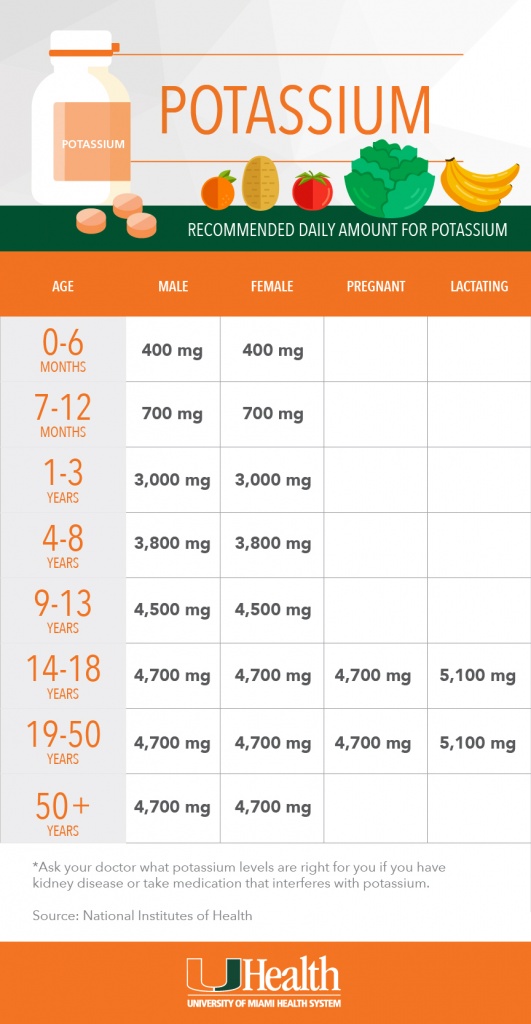Ask the Dietitian: Do You Need Potassium?

In the fifth of our seven-part series on minerals, we talk about potassium with Sheah Rarback, a registered dietitian nutritionist with the University of Miami Health System.
UMiami Health News: Why is potassium important?
Sheah Rarback: Potassium sends electrical signals within your cells that tell your body what to do. Without it, your organs, muscles, and nerves would not function. It also lowers acidity, which strengthens your bones by preventing calcium from leaching from your body. By regulating acidity, potassium can help you avoid kidney stones. When you have higher levels of potassium in your body, you secrete more sodium. By keeping your sodium levels in check, potassium prevents cardiovascular diseases such as stroke, high blood pressure, and heart failure. If you have high blood pressure, make sure you get enough of this nutrient, in addition to lowering your salt intake.
UMHN: How can I tell if I’m low in potassium?
Rarback: Deficiencies are rare because this is one of the most easily absorbed minerals and it’s in almost every type of food. The kidneys control how much potassium you secrete during urination. Healthy people with normally functioning kidneys rarely need to worry about a deficiency.
However, some health issues can create a deficiency. These include alcoholism, excessive sweating, overuse of laxatives or diuretics, as well as vomiting and diarrhea from a food-borne illness. With excessive sweating or a food-borne illness causing fluid loss, you lose other nutrients as well. That’s why it’s important to drink Gatorade or another electrolyte-restoring beverage.
And while deficiencies are uncommon, the symptoms are unpleasant when they occur. Potassium depletion (hypokalemia) leads to salt sensitivity, high blood pressure, kidney stones, and bone formation. In mild cases, hypokalemia may also cause muscle weakness, constipation, and fatigue. If you experience these symptoms, ask your doctor to test your potassium levels. Extremely low levels can lead to life-threatening problems, especially in people with kidney or heart disease.
UMHN: Can I get too much potassium?
Rarback: Generally no, although some people are at risk for potassium buildup (hyperkalemia). Symptoms of hyperkalemia include nausea, diarrhea, vomiting, stomach aches, ulcers, muscle weakness, paralysis, irregular heartbeat, and prickling or burning sensations in the feet, toes or hands. The ages and conditions at risk for hyperkalemia include:
- Infants
- The elderly
- Kidney disease
- Heart failure
- Diabetes
- Addison’s disease
- Alcohol abuse
- Ongoing use of NSAIDS, ACE inhibitors, diuretics, heparin
I never recommend potassium supplements. The simplest and best way to stay balanced is by eating five servings of fruits and/or vegetables daily. Hyperkalemia or hypokalemia indicate an underlying health issue. If you have any of the previously mentioned risk factors, you should be under a doctor’s care.
UMHN: Which foods have the most potassium?

Rarback: The best food sources include:
- Apricots
- Lentils
- Prunes
- Acorn squash
- Raisins
- Potatoes
- Kidney beans
- Orange juice
- Soybeans
- Bananas
- Spinach
- Sunflower seeds
- Tomatoes
- Cantaloupe
- Milk
- Yogurt
- Chicken breast
- Salmon
- Sirloin beef
- Molasses
The Takeaway:
Potassium helps cells communicate with your nerves, muscles, and organs. Maintaining adequate amounts is easy – just eat a balanced diet with at least five servings of fruits and/or vegetables daily. There’s no need to supplement unless you have an underlying medical issue or are prone to excessive sweating, regularly take laxatives or diuretics or lost fluid from an illness. Replenish potassium with electrolyte-enriched drinks like Gatorade. If you need to lower your blood pressure, don’t just reduce salt; make sure you’re eating potassium-rich foods, too.
Q&A compiled by Nancy Moreland, a contributing writer for UMiami Health News.
Tags: healthy eating, Miami Nutritionist, Nutrition, potassium
